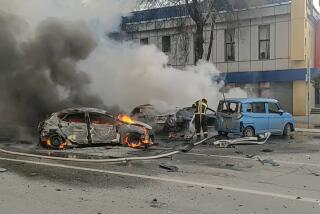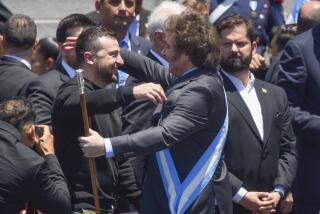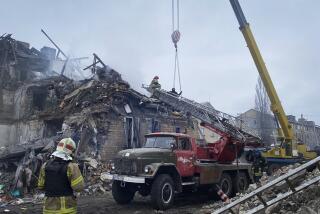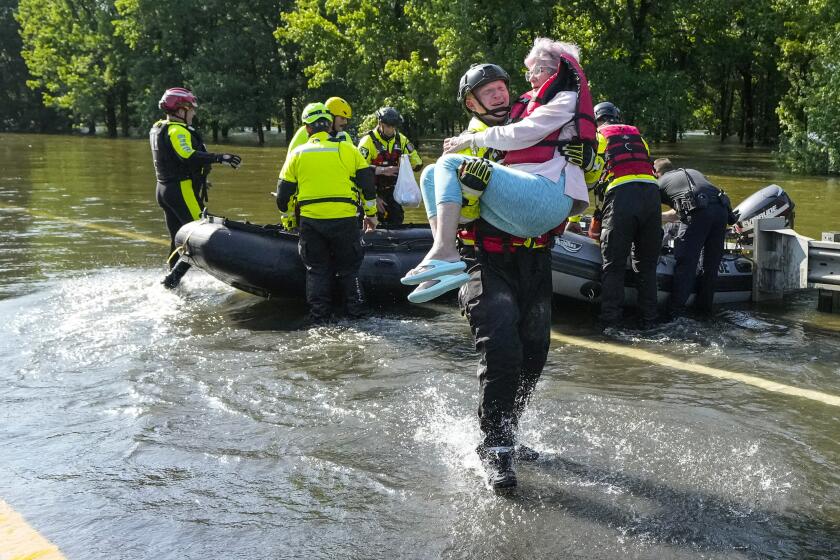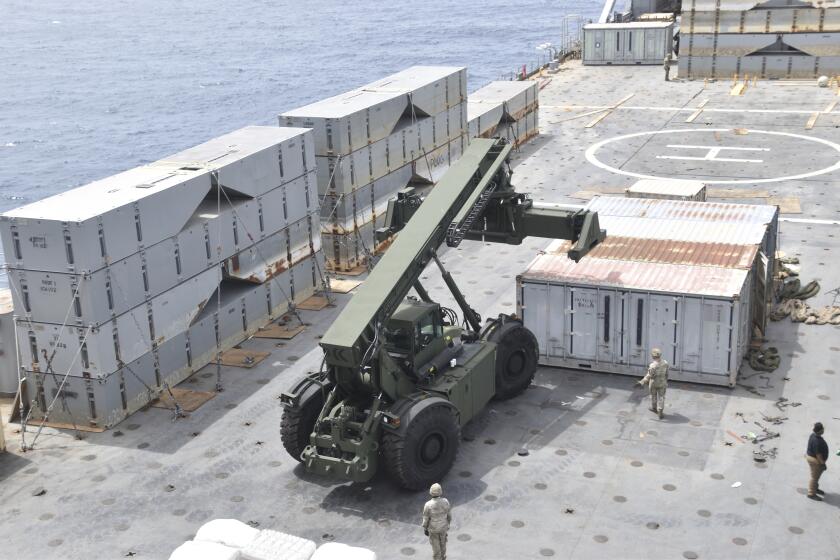Ukraine leader dissolves parliament; Russian tanks reportedly blocked
Ukrainian President Petro Poroshenko dissolved the country’s contentious parliament Monday and set new elections for Oct. 26 in a move likely to deepen Ukraine’s bitter east-west divide.
Poroshenko’s government earlier in the day accused Russia of sending an armored column into eastern Ukraine. It was the latest report of an intensifying infusion of arms and mercenaries from the neighboring country, which invaded and annexed Ukraine’s Crimean peninsula five months ago.
Col. Andriy Lysenko of the Ukrainian National Security and Defense Council said the 10 tanks and four heavy military vehicles had been intercepted as they attempted to make their way to Mariupol, a steel-making city on the Sea of Azov that is now a vital port for Ukraine after the loss of access to the Black and Mediterranean seas from Crimea.
In Moscow, Russian Foreign Minister Sergei Lavrov said he had no information about the reports of a Russian armored column entering Ukraine.
Poroshenko was to meet Tuesday with Russian President Vladimir Putin and the leaders of Belarus and Kazakhstan at a summit in the Belarusian capital of Minsk, called by the Kremlin leader to discuss the shifting trade relationships between Ukraine, now allied with the European Union, and the three other former Soviet republics.
Putin and Poroshenko were also expected to discuss the conflict in eastern Ukraine, which has taken more than 2,000 lives since April. Ukrainian officials and their Western allies accuse Moscow of fomenting the separatist uprising in the eastern regions and arming the militants, charges the Kremlin has denied.
Ukrainian troops halted the 14-vehicle Russian column after it entered Ukraine at 5:20 a.m. Monday. Lysenko said two of its tanks were destroyed and the gunmen taken into custody. It was the latest reported intrusion of Russian military hardware and gunmen backing the separatists, who have lately lost most of their seized territory to the government’s counterattack.
NATO officials said last week that Russian artillery had been firing on government positions from within the Ukrainian war zone as well as from across the Russian border. On Monday, the Associated Press reported that its reporters stationed near the border had witnessed convoys of Russian arms and fighters enter Ukraine on three occasions last week.
Poroshenko had promised during his presidential campaign in spring to move up parliamentary elections to resolve the political standoff that has ensued since former President Viktor Yanukovich was deposed by a pro-West rebellion in late February.
Deputies of Yanukovich’s Party of Regions held a majority of seats before their leader was toppled and sent fleeing to Russia. Many laid low for a brief time after the overthrow, leaving the parliament in the hands of opposition deputies who stacked the national and regional leaderships with Party of Regions opponents.
The parliament has been largely dysfunctional since Yanukovich fled; deputies have failed to adopt the election law changes sought by Poroshenko that would allow a new vote and to consider constitutional changes to cede more autonomy to the disparate regions.
Poroshenko said in a statement that the Supreme Council, or Rada, was riven by conflict because many of the deputies were “direct sponsors or accomplices” of the separatists creating havoc in eastern Ukraine.
Western and central Ukrainians tend to favor closer ties with the European Union, and it was Yanukovich’s rejection of an EU association deal in November that sparked the rebellion against him. Eastern Ukraine, by contrast, has long been integrated with Russia’s military-industrial complex, and workers there feared their heavily subsidized enterprises would be closed down if Ukraine retooled its economy to conform with the more competitive strictures of the 28-nation EU.
Prime Minister Arseny Yatsenyuk, who attempted to resign after the governing coalition fell apart last month, will remain head of government until the Oct. 26 election produces a new legislature, the presidential statement said.
Although the Donetsk and Luhansk regions in the east were dominated by Yanukovich loyalists, the former president’s authority elsewhere in the country had waned since the 2010 election that brought him to power.
The announcement of early parliamentary elections might also have been made on the eve of the Minsk summit to fend off pressure from the Kremlin for Kiev to negotiate an end to the conflict in eastern Ukraine rather than seek military victory over the separatists.
Ukrainian forces have closed in on the pro-Russia militants in recent weeks, posing the prospect of a rout that would reinforce the Russian media’s message that the new leadership in Kiev is hostile toward Ukraine’s Russian minority.
German Chancellor Angela Merkel visited Kiev on Saturday for talks with Poroshenko and Yatsenyuk. She cautioned against expectations that the Minsk gathering could lead to a major breakthrough in the conflict, which has pitted Ukraine and Russia in the deadliest confrontation to afflict the region since the 1991 collapse of the Soviet Union.
Special correspondent Butenko reported from Kiev and Times staff writer Williams from Los Angeles. Special correspondent Isabel Gorst in Moscow contributed to this report.
More to Read
Start your day right
Sign up for Essential California for news, features and recommendations from the L.A. Times and beyond in your inbox six days a week.
You may occasionally receive promotional content from the Los Angeles Times.
